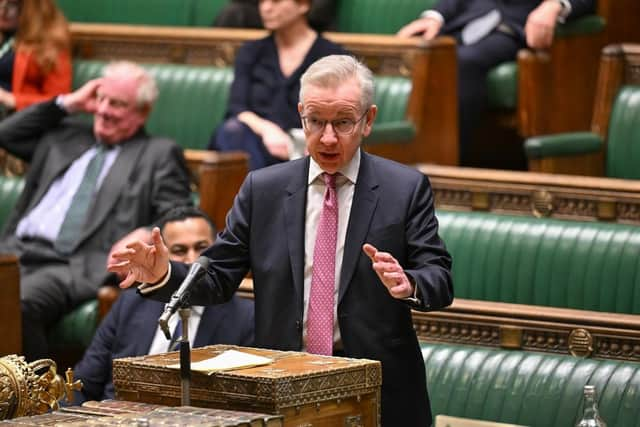Concerns about impact of Communities Secretary Michael Gove's new definition of extremism on freedoms in Northern Ireland
and live on Freeview channel 276
Ministers have unveiled a new extremism definition under which certain groups will be blocked from government funding and meeting officials.
The definition says extremism is promoting an ideology based on violence, hatred or intolerance, that aims to negate the fundamental rights and freedoms of others; undermine or replace the UK’s democracy or intentionally create a permissive environment for any of the above.
Advertisement
Hide AdAdvertisement
Hide AdCommunities Secretary Michael Gove said he is targeting neo-Nazi and extreme Islamist groups.


Neither Whitehall nor the Department of Justice clarified yesterday if it would apply to NI.
English-based Campaign group Christian Concern said that being "anti-abortion" is already seen as a potential sign of extremism by the Government's anti-terror Prevent programme.
It claimed that anyone critical of same-sex marriage or transgender ideolgy could fall foul of the new definition.
Advertisement
Hide AdAdvertisement
Hide AdIt noted that in England, Anglican school chaplain Rev Dr Bernard Randall and teacher Svetlana Powell had both been reported to Prevent after expressing Christian views in LGBT discussions.
Former First Minister, Baroness Arlene Foster, said the definition is not a change in the law and will ensure extreme groups are not funded by the Government.
"In that case it would presumably extend to groups in NI who fall under the definition and who apply for funding," she said.
"It is unclear what impact it would have on such groups which fall under the definition and apply for NI executive funding? That probably is the issue which the NI assembly would have to decide."
Advertisement
Hide AdAdvertisement
Hide AdA spokesman for the Presbyterian Church in Ireland said balanced proposals would be welcomed but that it is "very wary of unreasonable state interference with respect to freedom of thought, freedom of religion, freedom of speech, or freedom of assembly".
It also warned of possible "unintended consequences" that would "limit basic fundamental freedoms either through the interpretation, or application, of this new definition brought forward by the UK Government."
DUP MP Sammy Wilson and Belfast priest Fr Paddy McCafferty both supported Belfast pastor Jim McConnell when he was acquitted of making "grossly offensive" remarks about Islam in 2015.
Fr McCafferty said of the new definition: "There exists already sufficient legislation to protect people from hate. All of this is extremely mischievous and dangerous to freedom of speech and thought.”
Advertisement
Hide AdAdvertisement
Hide AdMr Wilson suggested the true motivation might be for Tories to "give the appearance of doing something" ahead of the general election. But he was also concerned about such guidelines causing "a fear factor, even in a normal social interaction, such as conversations with friends around the dinner table."
However Mr Gove told the Commons on Thursday that human rights would not be compromised.
He said: "Freedom of expression, freedom of religion and belief, the rule of law, upholding democracy and equal rights – these are the cornerstones of our civilised society which as a government – as a Parliament, on every side of this House - we strive always to uphold," he said. "So let me be clear, our definition will not affect gender critical campaigners, those with conservative religious beliefs, trans activists, environmental protest groups or those exercising their proper right to free speech."